Posts Tagged ‘World Relief Kenya’
Women and Men Leading Together
“So God created humankind in his own image,
in the image of God he created them;
male and female he created them.”
– Genesis 1:27
In the Beginning
In the beginning, God created — God separated the land from the sea; made plants and animals, fish and birds, men and women. When it was finished, God looked around at all that had been made and called it very good.
As a woman, I (Nancy), have sometimes struggled to understand what very good means for me. Like so many women across the world, I grew up in a society that viewed men as superior to women.
I was taught to believe that God was a man and that women were the cause of all the troubles and hardships that humans currently face because women sinned first.
In my work as a Monitoring & Evaluation Manager and Integral Mission Coordinator at World Relief Kenya, I often engage with pastoral communities who hold very strong beliefs about women and their positions in society. There have been times when I have felt like I am not good enough due to the way people have reacted to me and the directions I give them.
And yet, despite all this, God is at work.
God’s Vision for Gender Equality
I never dreamed that working at World Relief would transform the way I view myself and other women. But that’s what happened when, in 2021, my colleague James and I walked through a curriculum called Women and Men Leading Together. World Relief is currently rolling out this curriculum to a majority of its international programs staff.
This curriculum lays out a biblical foundation for gender equality by looking at five key points:
- Imago Dei – we are made in the image of God
- Patriarchal Cultures – how they harm both women and men
- Jesus’ Radical Example of Redemption and God’s Original Design for Marriage
- The importance of using rules of interpretation when reading scripture
- Organizational Leadership and countering gender inequality in the workplace
Over the course of eight weeks and seven learning sessions, we learned that men and women are created equally in the image of God, a concept often referred to as Imago Dei. And while men and women are two different expressions of God’s image, the authority to “practice dominion over all the earth” has been delegated to us equally.
We also gained a deeper understanding of the patriarchal cultures we live in, and how cultural norms can often trap both men and women into harmful gender stereotypes.
Culture often tells men that they must be the protector and provider and that they should be the opposite of women, never showing any emotion or gentleness. On the contrary, women are told they are weak, less than men and should yield all leadership and authority to men.
Both of these viewpoints, however, fall short of God’s desire for the freedom and flourishing that God intends for each one of us, regardless of our gender.
God’s Word is Powerful In Us
As we worked through the curriculum, I (James) gained an expanded understanding that everyone — women and men — are gifted and can serve in any capacity. A person should not be judged because of their gender, and everyone deserves equal respect. Jesus, himself, had women in his inner circles. He taught them and invited them into leadership alongside him.
The training helped me to be even more deliberate in being mindful of others, especially across the gender divide. We are all gifted and endowed, and we need to support one another.
The biblical references were very enlightening and helped me see that some of the arguments against gender equality that I had grappled with previously were based on a misinterpretation of scriptures. I now feel more equipped to advocate for gender fairness in the community, and I have the knowledge and basis needed to back up my viewpoint.
For me (Nancy), learning about the examples of powerful women in the Bible like Deborah, Esther, Ruth, Naomi and Priscilla was very encouraging in my faith. I am stronger and more confident and have begun stepping up to lead more in my local church and at my place of work.
The Holy Spirit revealed to me that I am a child of God, fearfully and wonderfully made in his image. I should not fear anything for God is always with me and will never forsake me. As Psalm 121 says, my help comes from God.
Carrying the Vision Forward
The transformation we have experienced and the understanding we’ve received has now given us the opportunity to teach and train others on our team, in preparation for incorporating more gender-equality work in our programming.
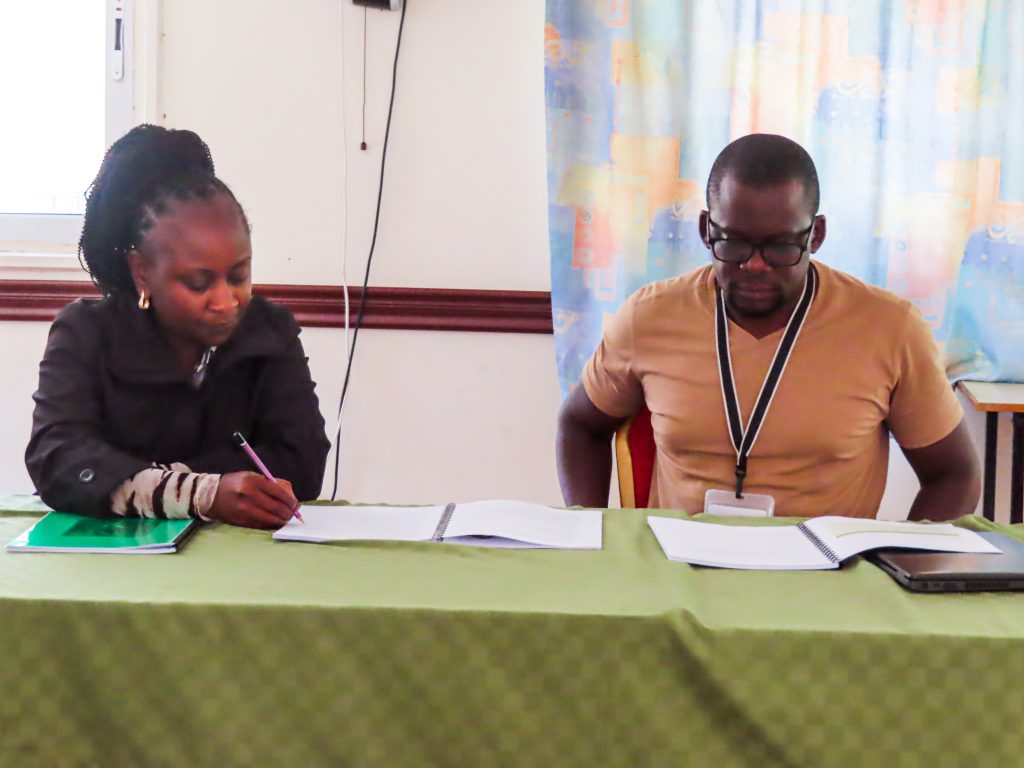
We have noticed that many women in our workplace, especially in our field offices, seem to lack the confidence God longs for them to have. They often stay silent or hesitate to address others in public settings. It is up to us as leaders to walk with these ladies, intentionally giving them roles in workshops as a way of building up their confidence as they grow.
Research from the World Economic Forum, Pew, Harvard Business Reviews and others have shown that organizations are more successful where women are equally represented in leadership.
Not only that, but elevating women in leadership and leading alongside one another as equals is a call to be counter-cultural. We get to follow Jesus’ example and counter the effects of gender bias in the workplace.
Men also have a very vital role to play in combatting gender inequality in the workplace. In most cases, gender authority and imbalance is in favor of men. Men, therefore, have to use their positions of authority to be the agents of change that are needed to create a gender-equal world. And men can begin this transformation by changing how they treat their wives, daughters and mothers right within their own homes.
As we, and others across World Relief’s global offices, continue to engage with this training, it is our hope that our fellow staff members, church partners and volunteers can approach this curriculum with an open mind, be willing to learn from what was God’s original intention at creation and adjust our actions accordingly.
In Kenya, we have already seen our entire staff team be more keen on reducing gender bias in our day-to-day work and conversations. Moving forward, we are committed to assessing our progress not just through our interactions with one another, but through our staffing and leadership structure, mainstreaming gender activities across all our programming, and working to ensure our policies and procedures align with our gender-inclusive vision.
We are grateful for the work that God is doing in us and among our team to bring healing and restoration to our world. God’s word is, indeed, more powerful through us because of the work the Spirit has done within us.
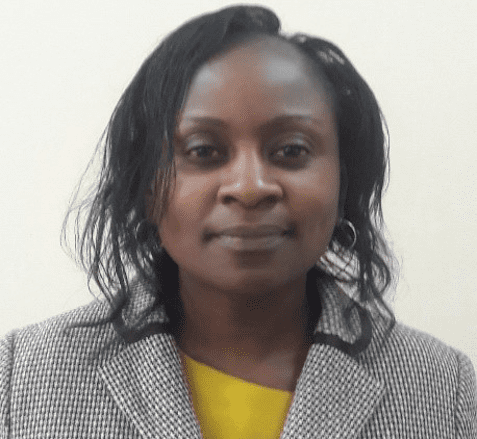
Nancy Nasirumbi Owola joined World Relief in 2017. She is a social entrepreneur with a passion for serving the most vulnerable through teaching business skills to those disadvantaged or underprivileged in the community. Nancy has worked in community development since 2006 and has also worked as a consultant, offering technical support to 20 Kenya Community Development Foundation partners in Value Chain Development & Enterprise Development. Her professional background includes entrepreneurship, monitoring & evaluation, business administration & management, and marketing. Today, she serves as the Integral Mission Coordinator as well as the M&E Evaluation Manager for World Relief Kenya.
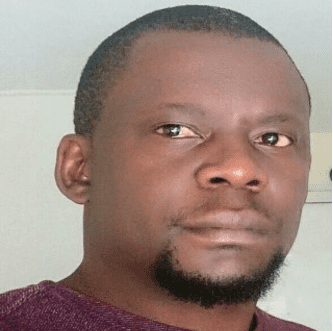
James Wanda joined World Relief Kenya in May 2020 as the SCOPE and National Health Manager. He graduated with a Bachelor of Science in Nursing from Moi University and has a Diploma in Project Management from Kenya Institute of Management. He is currently pursuing a Master’s Degree in Public Health at Jomo Kenyatta University of Agriculture and Technology. With more than 15 years of experience in public health programming, he’s worked with organizations such as The Walter Reed Project, Catholic Medical Mission Board, Jhpiego Kenya and AMREF. Prior to joining World Relief, he worked as a Project Manager and acting Executive Officer for Kenya Pediatric Association. James believes in justice and fairness to all and service to humanity is his call.
Share the Gift Pt. 1: How One Community in Turkana Is Paying it Forward
Hands Meeting in the Pot
Turkana County, Kenya, is not an easy place to live. Some have even referred to it as the oven of the world. High temperatures hover at an average of 95 degrees Fahrenheit. The air is dry, and rainfall is scarce.
Many residents have lost all their livestock due to persistent drought, and malnutrition is rampant — especially among children whose mothers struggle to produce enough milk to feed them due to their own dietary deficiencies. And yet, a culture of generosity and creativity is giving way to hope and innovation in partnership with World Relief.
Because of the sheer hardness of life in Turkana, community members have developed strong relationships and social capital with one another, depending on each other greatly. You may often hear stories of Turkanans moving to the United States or Australia to work. The money they make is sent home, often supporting several households.
Turkanans even have a saying, which goes, “It is best for your hands to meet in the pot, licking fingers with nothing, than it is for you to have a big meal in front of you to eat all alone.”
This idea of giving to your relatives and neighbors is an ingrained way of life in Turkana. And it is this way of life that has led to a new program called Share the Gift in the Karebur and Kachoba communities.
Introducing the Galla Goat
World Relief began working in Turkana in 2011 in response to a drought-induced food crisis. At the time, one-third of the population suffered from malnutrition. We collaborated with local churches and community members to seek solutions to these issues, and together, we developed robust programming around the issues of food and water security — including introducing a new breed of goats to the region, the Galla goat. Galla goats are a specialized, drought-resistant breed of goats. News outlets like NPR have called them “super goats” because of their ability to withstand high heat.
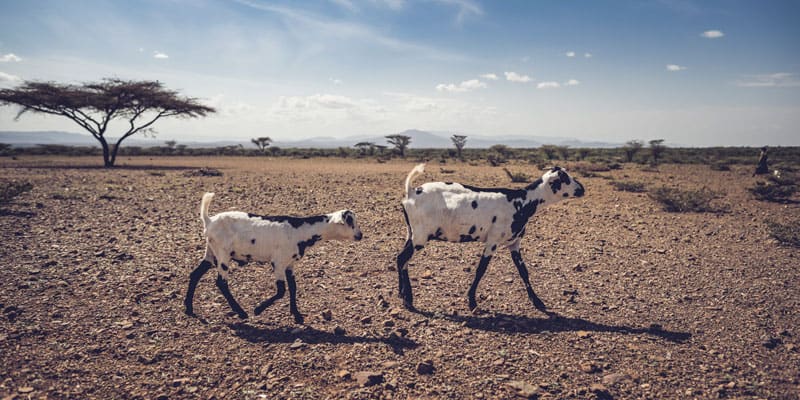
Initially, many Turkanans were skeptical about the new breed. Their goats were red, and the Galla goats were white. These pastoralist men were proud of their livestock and treasured their red goats. Likewise, they feared the white goats would be easier to spot leaving them prone to conflict or theft.
But as they came to see that the Galla goats were superior — they produced more milk, matured faster and fetched higher prices at the markets — they became more willing to give the goats a try.
Sharing the Gift in Karebur
While the Galla goats are, themselves, a gift and a miracle, in 2019 World Relief worked with local churches in the Karebur Village to take things a step further. Together, they designed the first share-the-gift project.
Under the guidelines of this initiative, 20 women were each gifted a Galla goat and each committed to gifting the first female offspring from their goat to another, equally needy person in the community. From there, the chain reaction would begin, until everyone had access to a Galla goat.
Akiru was one of the first 20 women to receive a goat.
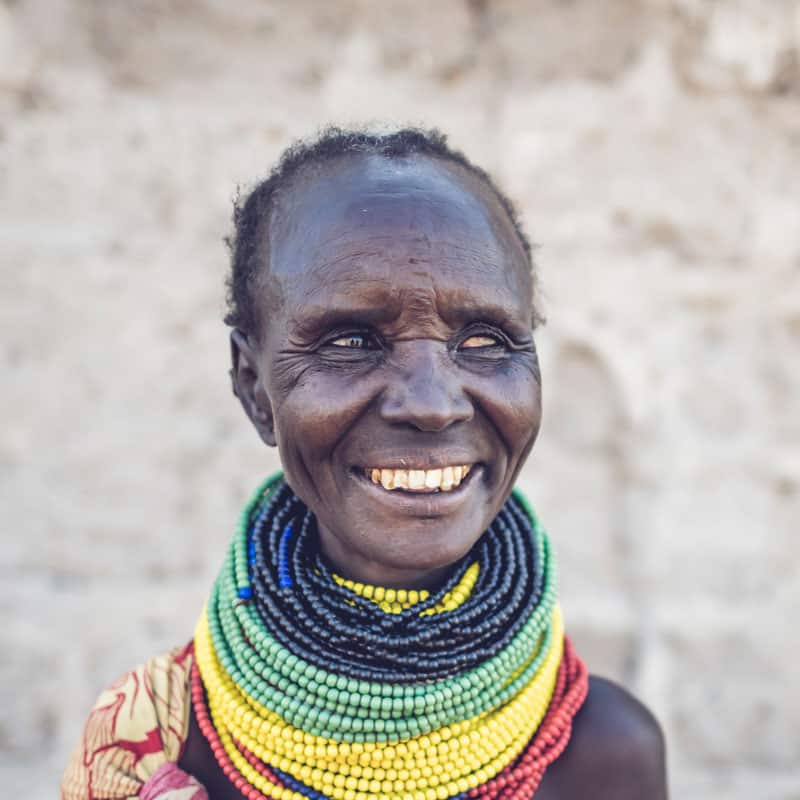
“I love Karebur Community because of the unity and love [we] have for each other… Life has always been a struggle in our community. The drought has always been with us and our goat breeds had been deteriorating as their body sizes had been diminishing and so was their production. The gift of an improved goat was indeed a blessing to us.
I remember during the first lactation the goat produced a lot of milk which was enough for my (own) family’s use and there was surplus milk, which we could share with my neighbor. The gifted goat was such a blessing.”
In early 2021, after the initial 20 goats had produced offspring, the goats’ owners stayed true to their commitment and gifted their first female offspring to others in the community. Women like Anna received the tangible provision of sustenance as well as a renewed sense of connectedness with her friend and neighbor.
“The goat from [my]neighbor has improved our relations for the better. My neighbor now is like a very close relative as a result of the bond of caring resulting from this valuable gift of love,” she said.
The share-the-gift project is just one part of an expansive community development project in Turkana that is made possible when we move together. The local church networks in the area continue to supervise these projects, ensuring that the seed of love first planted by World Relief will saturate the entire community so that every household has the chance to receive and improve their livestock.
You, too, can share the gift this season. Your gift of $60 can make a huge difference in the lives of the most vulnerable around the world, including supplying a goat to a family in Turkana!
Will you give the gift of hope and lasting change this season?
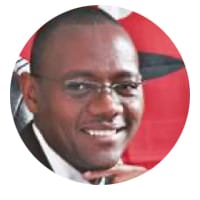
Elias Kamau serves as Country Director at World Relief Kenya. He has over 20 years of experience in humanitarian and development work in various countries including South Sudan, Somalia, Haiti, Kenya and Sudan. He started his career as a schoolteacher rising to the position of Director of External Studies and Continuing Education and successfully trained teachers in and out of Kenya. Exposure to the plight of refugees while serving as an education and training consultant in the sprawling Dadaab Refugee camps in Northern Kenya marked a turning point in his life. He resigned his position with the government feeling called to those vulnerable people. He went on to serve them in some of the poorest parts of the Horn of Africa where he held various positions with reputable International organizations including CARE, Norwegian Church Aid, International AID Services and World Concern among others before joining World Relief. Elias lives in Nairobi with his family including his wife Phelista and two children; a girl and a boy. He enjoys making friends and sharing the love of Jesus.

Oliver Otsimi serves as the Turkana Program Manager at World Relief. He holds a Bachelor’s degree in Environmental Studies (Community Development) and post graduate trainings in Horticultural Crop Production and Post-Harvest Technology, Agribusiness and Marketing. Oliver is studying for a Masters degree in Project Planning and Management at Maseno University. Oliver’s ambition is to positively transform poor households achieve food security and prosperity to enable them live a life of dignity as intended by God. He is married to Pamela and they have two children.
Get to Know Our Staff: Kenya
In 2021, we’re giving you the inside scoop on the work that World Relief is doing in communities around the world through a new series called, Get to Know Our Staff. Each month, you’ll hear from a different staff member from across the World Relief network. Through videos, stories and interviews you’ll learn more about who they are, the communities where they work, what they do and why they love what they do.
On deck this month is Noah Sankale Pesi, our Church Empowerment Zone Coordinator in Kajiado, Kenya. Noah has been working at World Relief Kenya since 2018 and is passionate about seeing churches mobilized to serve the most vulnerable. Hear more from Noah in the video below!
Do you want to create lasting change alongside passionate, mission-driven coworkers like Noah? World Relief is growing our team to meet the increased needs of our world, and we’re looking for people like you to join us.
Savings For Life: Financial Opportunity for the World’s Most Vulnerable

The world’s poorest have a tremendous capacity and willingness to save and protect assets when financial institutions cannot serve them. They save to meet social obligations, to prepare for emergencies, to start or expand small businesses and to respond to seasonal changes in cash flow. However, the lack of banks in rural areas often leads to high fees and unattainable minimum balance requirements, leaving savings vulnerable to loss and theft.
Since piloting the Savings for Life program in 2008, World Relief has empowered more than 100 thousand participants across six countries through the facilitation of effective and impactful community-based savings and credit groups. After years of testing and expanding, World Relief has developed a program that offers safe and reliable financial services to people who are otherwise excluded from formal banking institutions. Through regular savings and access to appropriately sized loans, group members can meet daily household needs and establish their own income-generating activities.
The Savings for Life program, like other World Relief initiatives, is also one of spiritual transformation. It is integral to the fulfillment of World Relief’s mission to “empower the local church to serve the most vulnerable.” Churches are the point of contact in communities where World Relief is present and pastors work to identify the most vulnerable within those communities. Church volunteers serve as field agents to mobilize and train the savings groups. Finally, World Relief promotes Savings groups because of its commitment to the holistic Gospel of Jesus Christ, a message that leads to transformation in every area of life.
Often, World Relief implements the Savings for Life program alongside other interventions. In Burundi, care group volunteers who bring life-saving health messages to more than 30 thousand mothers every month are invited to participate in Savings for Life groups. In Rwanda, Savings for Life is combined with leadership training so that church and community members can take initiative to meet the needs of vulnerable neighbors with their own resources. In the Democratic Republic of Congo, farmer group members involved in Savings for Life can buy better seeds and fertilizer with their own resources to produce greater yields.
Some of the most vulnerable in Kenya have also benefited from Savings for Life. Compared to other countries in East Africa, Kenya enjoys the largest, most diversified economy (USAID, 2013). Because of its location, the country serves as a place of transport and therefore plays a vital role for much of sub-Saharan Africa. However, decades of unjust governance have stunted economic development. About 60 percent of Kenyans live on US$2 or less per day (USAID, 2013). Kenyans facing poverty often lack access to the most basic financial services. Supplementing the life-impacting work of economic development, Savings for Life groups in Kenya educate members in managing their own savings. As savings accumulate, group members have access to appropriately-sized loans with which they can finance business or personal needs.
In 2011, a women’s group registered with World Relief in Kenya and Fadhili Trust to participate in a village savings and loan association in Ongata Rongai in Kajiado North. Group members save and lend their funds among themselves and also contribute to a social fund to assist with emergencies. When the group began to grow, the women registered with the Ministry of Gender, Children and Social Development to be recognized by other institutions and gain negotiation power for development. Now, they plan to begin using savings to purchase land for various group members. In the last two and a half years, not one of the members has defaulted on a loan or payment. This is the story of just one of several groups operating in seven regions across Kenya.

The groups also provide discipleship for members through regular Bible studies. World Relief believes that God’s restorative plan for mankind includes, among many things, character development with regard to stewardship, personal finance and attitude towards work. The goal is not wealth, but worship – pointing the most vulnerable to a right relationship with God through Jesus Christ and empowering them to live in a way that brings Him glory.
“The thief comes only to steal and kill and destroy; I have come that they may have life, and have it to the full.” John 10:10




